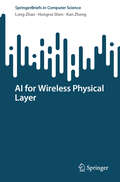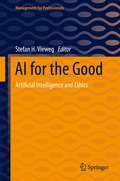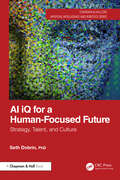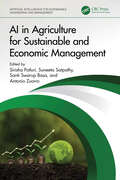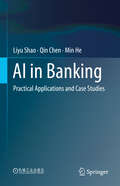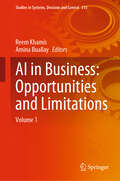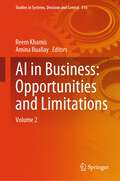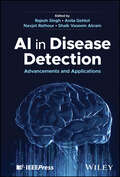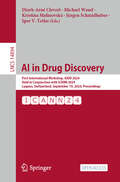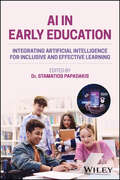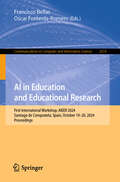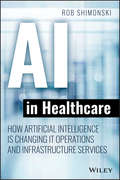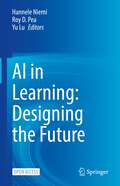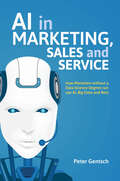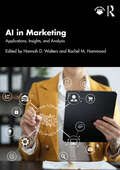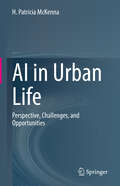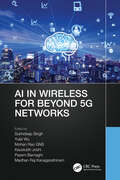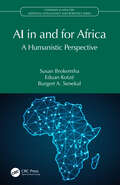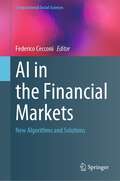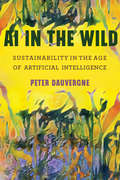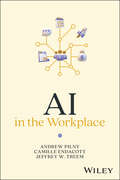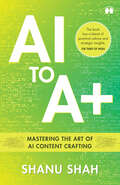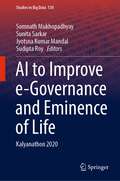- Table View
- List View
AI for Wireless Physical Layer (SpringerBriefs in Computer Science)
by Kan Zheng Long Zhao Hongrui ShenThe authors present research results on AI for wireless physical layer. Both the typical applications and model design for intelligent physical-layer communication are addressed. Along with a review of the literatures, the authors first present the integration of artificial intelligence (AI) and communication for sixth generation (6G) network or future communication networks. The authors also introduce the typic applications of AI on physical-layer technology, i.e., channel estimation and interpolation, the intelligent CSI feedback and precoding technologies for FDD and TDD systems, respectively, beam management for cell coverage. Finally, this SpringerBrief discusses future research directions. The authors believe the example mechanisms and demonstration of AI-based physical-layer communication and related findings could reveal useful insights for the application of AI on wireless network and spur. It&’s a new line of thinking for the performance improvement of future communication networks. This SpringerBrief targets advanced-level students majoring in the areas of communication engineering, information engineering, intelligent science, computer science, engineering and electrical engineering professionals and researchers seeking AI-based solutions for 6G physical-layer communications will also find this book a useful resource.
AI for the Good: Artificial Intelligence and Ethics (Management for Professionals)
by Stefan H. ViewegWhile technology advances at a high pace in the age of machine learning, there is a lack of clear intent and framing of acceptable ethical standards. This book brings together the complex topic of "good" technology in a cross-functional way, alternating between theory and practice.The authors address the ever-expanding discussion on Artificial Intelligence (AI) and ethics by providing an orientation. Pragmatic and recent issues are especially taken into account such as the collateral effects of the COVID19 pandemic. An up-to-date overview of digitization - already a very broad field in itself - is presented along with an analysis of the approaches of AI from an ethical perspective. Furthermore, concrete approaches to consider appropriate ethical principles in AI-based solutions are offered. The book will be appealing to academics, from humanities or business or technical disciplines, as well as practitioners who are looking for an introduction to the topic and an orientation with concrete questions and assistance.
AI for the Sustainable Development Goals (AI for Everything)
by Henrik Skaug SætraWhat is artificial intelligence? What are the Sustainable Development Goals (SDGs)? How does AI affect the SDGs? Artificial Intelligence has a real impact on our lives and on our environment, and the Sustainable Development Goals enable us to evaluate these impacts in a systematic manner. This book shows that doing so requires us to understand the context of AI – the infrastructure it is built on, who develops it, who owns it, who has access to it, who uses it, and what it is used for – rather than relying on an isolationist theory of technology. By doing so, we can analyze not only the direct effects of AI on sustainability, but also the indirect – or second-order – effects. AI for the Sustainable Development Goals shows how AI potentially affects all SDGs – both positively and negatively.
AI iQ for a Human-Focused Future: Strategy, Talent, and Culture (Chapman & Hall/CRC Artificial Intelligence and Robotics Series)
by Seth DobrinAI iQ for a Human-Focused Future: Strategy, Talent, and Culture offers a pioneering approach to integrating artificial intelligence (AI) and generative AI (GenAI) in business, emphasizing a business strategy first mindset over a technologycentric one.This book challenges the usual hype surrounding AI, advocating for a more realistic perspective. It delves into the evolution of AI, from traditional data science and machine learning to GenAI, all through the lens of strategic business application. Unlike other texts, this book moves away from case studies, favoring practical, real-world advice from extensive field experience. This book presents strategies for creating an environment that not only accepts but thrives on AI, focusing on strategic leadership, talent development, and inclusivity. It highlights crucial roles, such as the Chief AI Officer, and emphasizes the importance of diversity in AI teams. Uniquely, each chapter concludes with key takeaways, offering actionable steps, and implementation tips. This practical approach transforms theoretical concepts into actionable business strategies, providing leaders with the tools to apply AI initiatives effectively in their organizations.This book is more than an informative resource; it’s a practical toolkit for any business leader aiming to navigate the evolving landscape of AI and GenAI, ensuring their organization is prepared for sustainable growth and success in an AI-driven future.
AI in Agriculture for Sustainable and Economic Management (Artificial Intelligence for Sustainable Engineering and Management)
by Sirisha Potluri, Suneeta Satpathy, Santi Swarup Basa, and Antonio ZuorroThis book explains the best practices and their respective outcomes in artificial intelligence (AI) to meet sustainable development goals and demands. It examines the practices, technologies, and innovations at the core of various research issues to meet the sustainable development demands in agriculture to balance social, economic, and environmental sustainability with AI.AI in Agriculture for Sustainable and Economic Management discusses AI-driven nanotechnology approaches for precision agriculture and solutions for the optimization of farming resources and their management. The authors examine the impact of AI in agriculture and how technology-driven sustainable farming with smart waste-water treatment for zero waste for the circular economy can extend crop shelf-life. It discusses how AI expertise can be advantageous to envisage and evaluate the increasing demands of productivity, and to help to maintain ecosystems and strengthen the capacity for crop adaptation in response to drastic changes in climate and weather, natural disasters, and other significant factors. These findings and practices are also useful to emphasize how an agricultural ecosystem can be advanced and industrialized so that it can aid not only large commercial farms but also smaller farmlands. Finally, it also discusses how AI practices will help to find a balance between the volume of food manufactured and the proper maintenance of the ecosystem.This book is intended for researchers and upper graduate students interested in artificial intelligence in agricultural engineering, AI advances in crop science and technology for sustainable development.
AI in Banking: Practical Applications and Case Studies
by Min He Liyu Shao Qin ChenBig data and artificial intelligence (AI) cannot remain limited to academic theoretical research. It is crucial to utilize them in practical business scenarios, enabling cutting-edge technology to generate tangible value. This book delves into the application of AI from theory to practice, offering detailed insights into AI project design and code implementation across eleven business scenarios in four major sectors: retail banking, e-banking, bank credit, and tech operations. It provides hands-on examples of various technologies, including automatic machine learning, integrated learning, graph computation, recommendation systems, causal inference, generative adversarial networks, supervised learning, unsupervised learning, computer vision, reinforcement learning, fuzzy control, automatic control, speech recognition, semantic understanding, Bayesian networks, edge computing, and more. This book stands as a rare and practical guide to AI projects in the banking industry. By avoiding complex mathematical formulas and theoretical analyses, it uses plain language to illustrate how to apply AI technology in commercial banking business scenarios. With its strong readability and practical approach, this book enables readers to swiftly develop their own AI projects.
AI in Business: Volume 1 (Studies in Systems, Decision and Control #515)
by Reem Khamis Amina BuallayThis book is a comprehensive guide to understanding the potential of artificial intelligence (AI) in improving business functions, as well as the limitations and challenges that come with its implementation. In this book, readers will learn about the various opportunities that AI presents in business, including how it can automate routine tasks, reduce errors, and increase efficiency. The book covers a range of topics, including how AI can be used in financial reporting, auditing, fraud detection, and tax preparation. However, the book also explores the limitations of AI in business, such as the need for skilled professionals, data quality, and the potential for bias. It examines the challenges that companies face when implementing AI in business functions, including the need for ethical considerations, transparency, and accountability. The book is written for business professionals, business leaders, and anyone interested in the potential of AI in business functions. It offers practical advice on how to implement AI effectively and provides insights into the latest developments in AI technology. Through case studies and real-world examples, readers will gain a deeper understanding of how AI can be used to enhance business functions, as well as the potential pitfalls and limitations to be aware of. Overall, "AI in Business: Opportunities and Limitations" is an essential guide for anyone looking to harness the power of AI to improve their business functions, and to stay ahead in an increasingly competitive business environment.
AI in Business: Volume 2 (Studies in Systems, Decision and Control #516)
by Reem Khamis Amina BuallayThis book is a comprehensive guide to understanding the potential of artificial intelligence (AI) in improving business functions, as well as the limitations and challenges that come with its implementation. In this book, readers will learn about the various opportunities that AI presents in business, including how it can automate routine tasks, reduce errors, and increase efficiency. The book covers a range of topics, including how AI can be used in financial reporting, auditing, fraud detection, and tax preparation. However, the book also explores the limitations of AI in business, such as the need for skilled professionals, data quality, and the potential for bias. It examines the challenges that companies face when implementing AI in business functions, including the need for ethical considerations, transparency, and accountability. The book is written for business professionals, business leaders, and anyone interested in the potential of AI in business functions. It offers practical advice on how to implement AI effectively and provides insights into the latest developments in AI technology. Through case studies and real-world examples, readers will gain a deeper understanding of how AI can be used to enhance business functions, as well as the potential pitfalls and limitations to be aware of. Overall, this book is an essential guide for anyone looking to harness the power of AI to improve their business functions and to stay ahead in an increasingly competitive business environment.
AI in Disease Detection: Advancements and Applications
by Rajesh Singh Anita Gehlot Navjot Rathour Shaik Vaseem AkramComprehensive resource encompassing recent developments, current use cases, and future opportunities for AI in disease detection AI in Disease Detection discusses the integration of artificial intelligence to revolutionize disease detection approaches, with case studies of AI in disease detection as well as insight into the opportunities and challenges of AI in healthcare as a whole. The book explores a wide range of individual AI components such as computer vision, natural language processing, and machine learning as well as the development and implementation of AI systems for efficient practices in data collection, model training, and clinical validation. This book assists readers in assessing big data in healthcare and determining the drawbacks and possibilities associated with the implementation of AI in disease detection; categorizing major applications of AI in disease detection such as cardiovascular disease detection, cancer diagnosis, neurodegenerative disease detection, and infectious disease control, as well as implementing distinct AI methods and algorithms with medical data including patient records and medical images, and understanding the ethical and social consequences of AI in disease detection such as confidentiality, bias, and accessibility to healthcare. Sample topics explored in AI in Disease Detection include: Legal implication of AI in healthcare, with approaches to ensure privacy and security of patients and their dataIdentification of new biomarkers for disease detection, prediction of disease outcomes, and customized treatment plans depending on patient characteristicsAI’s role in disease surveillance and outbreak detection, with case studies of its current usage in real-world scenariosClinical validation processes for AI disease detection models and how they can be validated for accuracy and effectiveness Delivering excellent coverage of the subject, AI in Disease Detection is an essential up-to-date reference for students, healthcare professionals, academics, and practitioners seeking to understand the possible applications of AI in disease detection and stay on the cutting edge of the most recent breakthroughs in the field.
AI in Drug Discovery: First International Workshop, AIDD 2024, Held in Conjunction with ICANN 2024, Lugano, Switzerland, September 19, 2024, Proceedings (Lecture Notes in Computer Science #14894)
by Igor V. Tetko Jürgen Schmidhuber Michael Wand Kristína Malinovská Djork-Arné ClevertThis open Access book constitutes the refereed proceedings of the First International Workshop on AI in Drug Discovery, AIDD 2024, held as a part of the 33rd International Conference on Artificial Neural Networks, ICANN 2024, in Lugano, Switzerland, on September 19, 2024. The 12 papers presented here were carefully reviewed and selected for these open access proceedings. These papers focus on various aspects of the rapidly evolving field of Artificial Intelligence (AI)-driven drug discovery in chemistry, including Big Data and advanced Machine Learning, eXplainable AI (XAI), Chemoinformatics, Use of deep learning to predict molecular properties, Modeling and prediction of chemical reaction data and Generative models.
AI in Early Education: Integrating Artificial Intelligence for Inclusive and Effective Learning
by Stamatios PapadakisAn original and up-to-date examination of how to use AI to improve pre-school and early childhood education In AI in Early Education: Integrating Artificial Intelligence for Inclusive and Effective Learning, examines how to use artificial intelligence technology to enhance teaching and learning with personalized learning pathways, inclusive instructional practices, and increased student engagement. The book explores key themes, like AI literacy for young learners, ethical and pedagogical considerations, and the professional development that educators need to effectively integrate these tools into their classrooms. You'll also find: Ways to use AI to support diverse learners, including those with special educational needs Hands-on strategies that offer educators clear, practical ways to bring AI tools into the classroom A careful emphasis on inclusion strategies, demonstrating how AI can help tailor learning experiences to meet the needs of all students Perfect for educators, teacher trainers, researchers, regulators, and policymakers interested in how artificial intelligence might contribute to the improvement of early childhood and primary education, AI in Early Education is also a must-read for pre-service and in-service teachers and professionals involved in curriculum development and inclusive education.
AI in Education and Educational Research: First International Workshop, AIEER 2024, Santiago de Compostela, Spain, October 19–20, 2024 Proceedings (Communications in Computer and Information Science #2519)
by Oscar Fontenla-Romero Francisco BellasThis book constitutes the proceedings of the First International Workshop on AI in Education and Educational Research, AIEER 2024, held in Santiago de Compostela, Spain, during October 19–20, 2024. The 16 full papers presented in this volumes were carefully reviewed and selected from 23 submissions. They focus on various aspects on AI applications in educational settings, particularly emphasizing the integration of Large Language Models (LLMs) and explainable AI (XAI).
AI in Healthcare: How Artificial Intelligence Is Changing IT Operations and Infrastructure Services
by Robert ShimonskiThe best source for cutting-edge insights into AI in healthcare operations AI in Healthcare: How Artificial Intelligence Is Changing IT Operations and Infrastructure Services collects, organizes and provides the latest, most up-to-date research on the emerging technology of artificial intelligence as it is applied to healthcare operations. Written by a world-leading technology executive specializing in healthcare IT, this book provides concrete examples and practical advice on how to deploy artificial intelligence solutions in your healthcare environment. AI in Healthcare reveals to readers how they can take advantage of connecting real-time event correlation and response automation to minimize IT disruptions in critical healthcare IT functions. This book provides in-depth coverage of all the most important and central topics in the healthcare applications of artificial intelligence, including: Healthcare IT AI Clinical Operations AI Operational Infrastructure Project Planning Metrics, Reporting, and Service Performance AIOps in Automation AIOps Cloud Operations Future of AI Written in an accessible and straightforward style, this book will be invaluable to IT managers, administrators, and engineers in healthcare settings, as well as anyone with an interest or stake in healthcare technology.
AI in Learning: Designing the Future
by Hannele Niemi Yu Lu Roy D. PeaAI (Artificial Intelligence) is predicted to radically change teaching and learning in both schools and industry causing radical disruption of work. AI can support well-being initiatives and lifelong learning but educational institutions and companies need to take the changing technology into account. Moving towards AI supported by digital tools requires a dramatic shift in the concept of learning, expertise and the businesses built off of it. Based on the latest research on AI and how it is changing learning and education, this book will focus on the enormous opportunities to expand educational settings with AI for learning in and beyond the traditional classroom. This open access book also introduces ethical challenges related to learning and education, while connecting human learning and machine learning. This book will be of use to a variety of readers, including researchers, AI users, companies and policy makers.
AI in Marketing, Sales and Service: How Marketers without a Data Science Degree can use AI, Big Data and Bots
by Peter GentschAI and Algorithmics have already optimized and automated production and logistics processes. Now it is time to unleash AI on the administrative, planning and even creative procedures in marketing, sales and management.This book provides an easy-to-understand guide to assessing the value and potential of AI and Algorithmics. It systematically draws together the technologies and methods of AI with clear business scenarios on an entrepreneurial level. With interviews and case studies from those cutting edge businesses and executives who are already leading the way, this book shows you: how customer and market potential can be automatically identified and profiled; how media planning can be intelligently automated and optimized with AI and Big Data; how (chat)bots and digital assistants can make communication between companies and consumers more efficient and smarter; how you can optimize Customer Journeys based on Algorithmics and AI; and how to conduct market research in more efficient and smarter way. A decade from now, all businesses will be AI businesses – Gentsch shows you how to make sure yours makes that transition better than your competitors.
AI in Marketing: Applications, Insights, and Analysis
by Hannah D. Walters Rachel M. HammondAI in Marketing equips students with the knowledge to understand the impact of Artificial Intelligence (AI) on marketing strategies, processes, and activities, empowering them to navigate the AI-driven marketing landscape confidently.Divided into four parts, it provides a comprehensive exploration of AI's transformative role in marketing. The first part lays the groundwork, offering foundational insights into the intersection of AI and marketing. Part II explores the various applications of AI in marketing, and the tools marketers use to optimize their processes and deliver enhanced customer experiences. The third part focuses on leveraging AI for consumer insights, enabling marketers to craft data-driven strategies. The final part examines ethical considerations and the pedagogical integration of AI into marketing education. Each chapter includes real-world examples, exercises, discussion questions, key terms, and AI resources, empowering students to develop practical skills and industry-relevant knowledge.Students studying in advanced undergraduate and postgraduate marketing courses will benefit greatly from this comprehensive textbook, preparing them for a future workplace that requires them to know how to use AI effectively, ethically, and responsibly.The book is fully supported by online resources, including an instructor manual and customizable PowerPoint slides.
AI in Urban Life: Perspective, Challenges, and Opportunities
by H. Patricia McKennaIn exploring artificial intelligence (AI) in urban life, this book brings together and extends thinking on how human-AI interactions are continuously evolving. Through such interactions, people are aided on the one hand, while becoming more aware of their own capabilities and potentials on the other hand, pertaining, for example, to creativity, human sensing, and collaboration. It is the particular focus of research questions developed in relation to awareness, smart cities, autonomy, privacy, transparency, theory, methods, practices, and collective intelligence, along with the wide range of perspectives and opportunities offered, that set this work apart from others. Conceptual frameworks are formulated for each of these areas to guide explorations and understandings in this work and going forward. A synthesis is provided in the final chapter for perspectives, challenges and opportunities, and conceptual frameworks for urban life in an era of AI, opening the way for evolving research and practice directions.
AI in Wireless for Beyond 5G Networks
by Yulei Wu Sukhdeep Singh Madhan Raj Kanagarathinam Payam Barnaghi Kaustubh Joshi Mohan Rao GnsArtificial intelligence (AI) is a game changer in many domains, and wireless communication networks are no exception. With the advent of 5G networks, we have witnessed rapid growth in wireless connectivity, which has led to unprecedented opportunities for innovation and new use cases. However, as we move beyond 5G (B5G), the challenges and opportunities are set to become even more significant, offering new, previously unimaginable services. AI in Wireless for Beyond 5G Networks provides a comprehensive overview of the use of AI in wireless communication for B5G networks. The authors draw on their expertise in the field to explore the latest developments in AI technologies and their applications in B5G wireless communication systems. The book discusses a wide range of topics, including enabling AI technologies, architecture, and applications of AI from smartphones, radio access networks (RANs), edge and core networks, and application service providers. It also discusses the trends in on-device AI for B5G networks. This book is written in an accessible style, making it an ideal resource for academics, researchers, and industry professionals in wireless communication. It provides valuable insights into the latest field trends and developments and practical possibilities for implementing AI technologies in wireless communication systems. Above all, this book is a testament to the power of collaboration and innovation in wireless communication. The authors’ dedication and expertise have produced a valuable resource for anyone interested in the latest AI and wireless communication developments. This book will inspire and inform readers, and we highly recommend it to scholars interested in the future of AI in wireless communication.
AI in and for Africa: A Humanistic Perspective (Chapman & Hall/CRC Artificial Intelligence and Robotics Series)
by Susan Brokensha Eduan Kotzé Burgert A. SenekalAI in and for Africa: A Humanistic Perspective explores the convoluted intersection of artificial intelligence (AI) with Africa’s unique socio-economic realities. This book is the first of its kind to provide a comprehensive overview of how AI is currently being deployed on the African continent. Given the existence of significant disparities in Africa related to gender, race, labour, and power, the book argues that the continent requires different AI solutions to its problems, ones that are not founded on technological determinism or exclusively on the adoption of Eurocentric or Western-centric worldviews. It embraces a decolonial approach to exploring and addressing issues such as AI’s diversity crisis, the absence of ethical policies around AI that are tailor-made for Africa, the ever-widening digital divide, and the ongoing practice of dismissing African knowledge systems in the contexts of AI research and education. Although the book suggests a number of humanistic strategies with the goal of ensuring that Africa does not appropriate AI in a manner that is skewed in favour of a privileged few, it does not support the notion that the continent should simply opt for a "one-size-fits-all" solution either. Rather, in light of Africa’s rich diversity, the book embraces the need for plurality within different regions’ AI ecosystems. The book advocates that Africa-inclusive AI policies incorporate a relational ethics of care which explicitly addresses how Africa’s unique landscape is entwined in an AI ecosystem. The book also works to provide actionable AI tenets that can be incorporated into policy documents that suit Africa’s needs. This book will be of great interest to researchers, students, and readers who wish to critically appraise the different facets of AI in the context of Africa, across many areas that run the gamut from education, gender studies, and linguistics to agriculture, data science, and economics. This book is of special appeal to scholars in disciplines including anthropology, computer science, philosophy, and sociology, to name a few.
AI in the Financial Markets: New Algorithms and Solutions (Computational Social Sciences)
by Federico CecconiThis book is divided into two parts, the first of which describes AI as we know it today, in particular the Fintech-related applications. In turn, the second part explores AI models in financial markets: both regarding applications that are already available (e.g. the blockchain supply chain, learning through big data, understanding natural language, or the valuation of complex bonds) and more futuristic solutions (e.g. models based on artificial agents that interact by buying and selling stocks within simulated worlds).The effects of the COVID-19 pandemic are starting to show their financial effects: more companies in a liquidity crisis; more unstable debt positions; and more loans from international institutions for states and large companies. At the same time, we are witnessing a growth of AI technologies in all fields, from the production of goods and services, to the management of socio-economic infrastructures: in medicine, communications, education, and security. The question then becomes: could we imagine integrating AI technologies into the financial markets, in order to improve their performance? And not just limited to using AI to improve performance in high-frequency trading or in the study of trends. Could we imagine AI technologies that make financial markets safer, more stable, and more comprehensible? The book explores these questions, pursuing an approach closely linked to real-world applications.The book is intended for three main categories of readers: (1) management-level employees of companies operating in the financial markets, banks, insurance operators, portfolio managers, brokers, risk assessors, investment managers, and debt managers; (2) policymakers and regulators for financial markets, from government technicians to politicians; and (3) readers curious about technology, both for professional and private purposes, as well as those involved in innovation and research in the private and public spheres.
AI in the Wild: Sustainability in the Age of Artificial Intelligence (One Planet)
by Peter DauvergneExamining the potential benefits and risks of using artificial intelligence to advance global sustainability.Drones with night vision are tracking elephant and rhino poachers in African wildlife parks and sanctuaries; smart submersibles are saving coral from carnivorous starfish on Australia's Great Barrier Reef; recycled cell phones alert Brazilian forest rangers to the sound of illegal logging. The tools of artificial intelligence are being increasingly deployed in the battle for global sustainability. And yet, warns Peter Dauvergne, we should be cautious in declaring AI the planet's savior. In AI in the Wild, Dauvergne avoids the AI industry-powered hype and offers a critical view, exploring both the potential benefits and risks of using artificial intelligence to advance global sustainability.
AI in the Workplace
by Andrew Pilny Jeffrey W. Treem Camille EndacottOffers a smart, witty guide to understanding AI's role in the future of work With AI tools now integrated into everything from hiring systems and team collaboration platforms to strategic decision-making processes, there’s a pressing need to move beyond either fear or hype. AI in the Workplace explores how artificial intelligence is reshaping organizational life, often in ways that are subtle yet deeply consequential. This book answers that need by providing an accessible, critical, and often humorous guide for understanding what AI is, how it works, and what it means for the ways we work and interact in professional settings. AI in the Workplace demystifies AI through a blend of theory, storytelling, and practical insight. Readers are introduced to foundational AI concepts without overwhelming technical detail and are given frameworks to think through pressing questions of algorithmic management, workplace surveillance, bias, and ethics. Through contemporary case studies, real-world examples, reflective exercises, and actionable strategies, the book equips readers to think critically and act thoughtfully in the evolving AI landscape, whether that means embracing tools, resisting trends, or something in between. Helping readers grasp how AI is not simply replacing human labor, but reorganizing work itself, AI in the Workplace: Introduces the novel Human-Story-Text-AI Network model to conceptualize AI's integration into organizational life Examines algorithmic management through a critical lens to offer a fresh perspective on emerging managerial practices Discusses overlooked issues such as bias in training data and the sociopolitical dimensions of data-centric AI Includes hands-on thought experiments at the end of each chapter to stimulate discussion and critical thinking Explores “Singularity Management” and the implications of AI on human roles, ethics, and empathy in organizations Offers a five-part framework (the ”5 Es”) to guide ethical and strategic decision-making in AI-driven environments Provides a strategy that balances innovation and safety for regulating AI in the workplace Perfect for students and professionals alike, AI in the Workplace serves advanced undergraduate and graduate courses in Communication, Business, Technology Management, and related fields. It is also an invaluable resource for executive education and professional development in AI adoption, leadership, and organizational change.
AI on the Edge with Security: Foundations and Practices
by Naresh Kumar Sehgal Manoj Saxena Dhaval N. ShahThis book provides readers with an overview of the next generation of Cloud computing with AI, evolving to minimize latency and address privacy/security concerns of many customers. This book will highlight the associated problems and propose new solutions for performing AI and ML at the edge of computing networks.
AI to A+
by Shanu ShahUnlock the true power of your AI-generated content with AI to A+. Packed with practical strategies and proven techniques, this book equips you with the tools to elevate your writing to new heights. Each chapter presents a carefully crafted rubric designed to transform your drafts into polished, compelling narratives.Whether you are a seasoned content creator or just beginning to explore the world of generative AI, this guide offers actionable insights to make your work stand out. With a handy checklist and key takeaways included, applying these principles becomes a seamless part of your writing routine.More than just a manual, AI to A+ is your strategic partner in mastering the art of AI content editing. So, start your journey towards content excellence today and discover how to make every word count.
AI to Improve e-Governance and Eminence of Life: Kalyanathon 2020 (Studies in Big Data #130)
by Jyotsna Kumar Mandal Somnath Mukhopadhyay Sudipta Roy Sunita SarkarThe volume presents research works on developing Artificial Intelligence based algorithms and methodologies for making social good that too to a notable one. The book discusses latest findings on efficient technological solutions of e-governance and other areas of life from the leading researchers in the field. The prime focus is on solving socio-economic technical problems using state-of-the-art research findings like fuzzy computing, evolutionary and hybrid frameworks, neuro computing, etc., along with other AI based computation platforms. The topics covered include solution frameworks using Artificial Intelligence based models in application areas like agriculture and rural development, road accident, travel and tourism, solid waste management, rural medical care, crowd sourced election monitoring system, ragging, rape and other abuses, cyber criminals and cyber bullying, disaster management, social good, etc. The book offers a valuable resource for all undergraduate, postgraduate students and researchers interested in exploring solution frameworks for social good problems using artificial intelligence.
